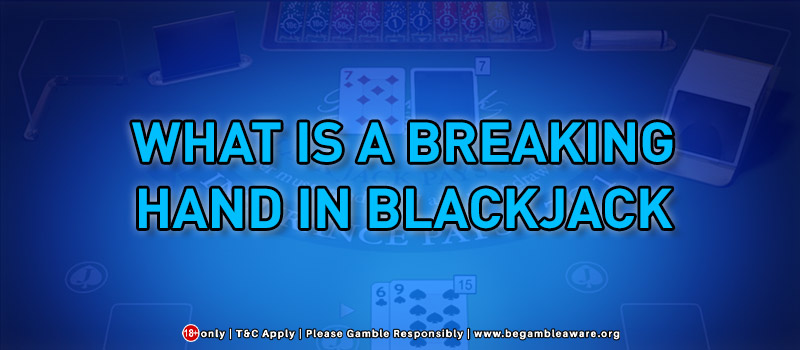Among the table games, Blackjack is king and will likely remain so for some time. Having evolved over centuries and been popular in multiple European royal courts of the period, it is rightly regarded as an exclusive game full of dash, class, and savage suspense.
Now, centuries of evolution has resulted in the game of blackjack evolved into multiple variants. These follow essentially the same rules, but with a few important differences here and there.
Across these variants, some common terms are used. One of this is a Breaking Hand. In case you were imagining a Mafia-like physical hand breaking, kindly perish the thought!

Actually, in the game of blackjack, a breaking hand is used in reference to a hand that can exceed 21 or will “break” when given an additional card, just like a hard 12 to 16. In case you were wondering, a breaking hand and a bust are totally different things, with the latter referring to a hand that at the moment is over 21 in value.
Breaking Hand- A Detailed Explanation
A breaking hand is also occasionally referred to as a “hard hand” or a “stiff hand”. It is a blackjack hand that lacks an ace, or a card hand that can exceed 21 in value when just another card is added to the mix.
As you might know, hands in blackjack are referred to as “stiff”, “soft” and “hard”. The best and most vital blackjack hand is an ace. Depending on the occasion, an ace gets counted as either 1 or 11, with this flexibility immensely benefiting players and their hands.
A “hard hand” or a “breaking hand” refers to a hand of blackjack that either has no ace or has one that must be counted as 1. Example, a hand of blackjack composed of a five, seven and an ace is known as a “Hard 13”. This is because here the ace must get counted as 1 rather than 11, as counting the ace card as 11 results in the hand going bust by exceeding 21 in value.
In blackjack, the “break card” refers to the card that can make the hand exceed 21 in value. To get consistent wins at blackjack, the player must be aware of the full import of both the breaking hands and the break cards. The player must avail himself of all strategies that will result in his having a hand that’s close as possible to 21 and able to triumph those held by other players and the dealer.
Should the player have a hand that’s more than 21 in value, he/she is “busted”. When there’s a “tie” no winner can be declared and the player usually has his bets returned.
When playing online blackjack, the house enjoys a great advantage in that the player is obliged to act first. Thus, if the player busts by getting a hand that’s valued at over 21, the casino speedily scoops up his/her money.